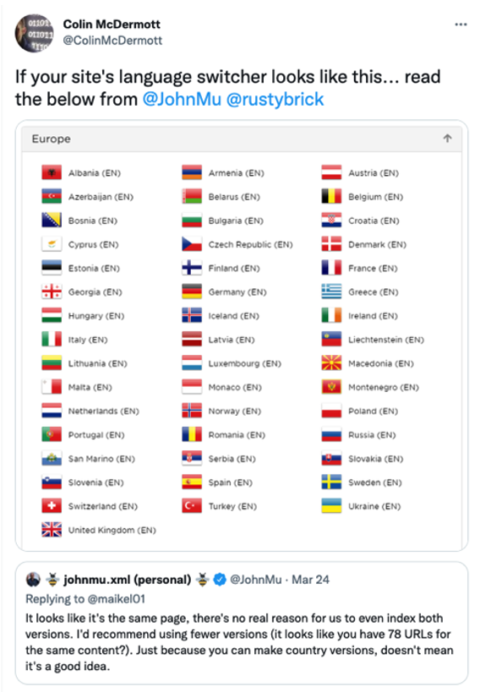In my last column, I addressed the business benefits of an International SEO Strategy, and the first benefit was to complement your broader global strategic plan.
This is a critical alignment especially when it comes to how you plan to deploy websites to target these markets.
Managing multiple global websites not only requires resources to create and maintain but also must add value for users in the target market.
How Many Market Sites Are Too Many?
Over the years, I have seen many companies translate their website into another language like Spanish or Arabic and then attempt to “maximize their investment” by cloning a local version to every market that speaks that language.
For one company, this approach resulted in 1,600 separate websites and over 18 million web pages most of which were not getting indexed as the pages were considered duplicates by Google.

On Twitter recently, John Mueller from Google answered a question from a post asking if having English language versions for EMEA markets was a good strategy.
His response was, “It looks like you have 78 URLs for the same content.”
He went on to say, “It looks like it’s the same page, there’s no real reason for us to index multiple versions.”
Develop Your Local Market Orientation
Local Market Orientation is the delicate balance of managing the expectations and needs of customers in a foreign market with the objectives, resources, and capabilities of your organization.
In your planning, you must consider each potential market relative to localizing to local business requirements, user behaviors, user expectations, language, currency, and any other elements that will foster customer engagement in the market.
Simply cloning an existing website into another language and then submitting it to Google is not sufficient.
An earlier article suggested tools that help you identify new markets that have both consumer demand and make it easier to conduct cross-border business.
Your content strategy will be driven by your local market orientation forcing you to plan across the entire conversion chain helping determine should this site be a single language global site, localized market site, or language-specific site, and whether technology adjusts to the user on-demand or dynamically.
This matrix will often drive your technology requirements.
Too many companies realize too late in their expansion process you do not do business with countries or regions but with people.
You cannot escape the Rubik’s Cube of variations when it comes to transacting with people.
People within a target market speak a specific language, use a specific currency and live in a specific location.
Dedicated Market, Language, Or Currency Sites
Companies that do plan to expand globally need to make several both long and short-term decisions.
Looking into their crystal ball what does their full expansion look like?
Expanding to a single additional market is vastly different from multiple markets in different parts of the world.
In the early stages of expansion, these decisions can be easy.
An Austrian company can target Germany relatively easily since they both speak German, use the Euro, and have cross-border shipping agreements.
In this case, do they even need another website?
Simply enabling a shipping calculator and VAT tax management may be all that is needed.
It gets more complicated when a U.S. website wants to target Mexico.
It will need a way to organize its Spanish web pages, covert prices to Pesos, ensure that the purchased products it can be shipped to the customer’s location in Mexico, and let consumers know if there are any additional costs for tariffs.
Once you have the Mexico infrastructure we may be tempted to expand further south into Argentina, Peru, or Chile.
Should we leverage the same Spanish language website and use a currency converter and shipping manager or are there specific market requirements and linguistic differences that will force us to use separate market websites?
I have seen several companies launch “EU” websites to target the European Union using the Euro.
They clone the global site on a “.eu” domain, convert prices to Euro, and assume they can magically target this region using a common currency and legal structure.
Sounds logical but despite using the same currency most of the markets speak different languages, which results in them failing to attract sufficient visitors to be viable.
Visual Or Technical Orientation
Once you have decided on your web structure you will need to consider the use of a visual orientation like forcing a user to engage a country/language selector to choose which site they want or technical orientation using either the visitor’s physical location or language preference to route them to a specific website.
There are many articles about the challenges of using the user’s local internet address to route users to specific websites based on where they accessed the site and the potential cultural errors of using a national flag of one country to represent a language across different markets.
For either method, it is critical that you test the implementation to ensure search engines can access all available content for either method.
Typically, selection pages set a cookie recording a user’s selection to eliminate the selector step in the future.
While great for users, search engines are often blocked from accessing any of the paths as they will not accept cookies preventing them from accessing any of the local websites.
Similarly, with IP and language detection, the system is designed to route users to specific versions of the website.
This is very common for ecommerce websites with market-specific pricing and/or rules for doing business in specific markets.
Unfortunately, this will often restrict search engines from entering these websites.
This makes it critical to ensure there are exceptions to the rules to allow search engines, including Google, to access any webpage they request as you don’t know where they crawl your sites from.
Conclusion
While there’s no easy answer to the question of how many global websites you should have or the number of pages within each, the best practice is to make the decision based on your business and market needs rather than just because you can.
Managing a successful multinational web presence does require detailed planning to ensure that the content you deploy adds value to users in the target market that encourages engagement.
At the same time, it should satisfy Google’s increasingly strict requirements of being relevant, authoritative, and unique enough to warrant it being indexed.
More resources:
- 4 Key Areas Of International SEO Focus For Entering A New Market
- International SEO for 2021 & Beyond: 9-Point Checklist for Success
- A Guide to Local SEO
Featured Image: ktasimar/Shutterstock


